“Don’t give up on us. Ask us if we are okay. Make sure we have adequate support, try to make sure that we’re not being exploited by psychiatry or other things, try to understand our illness and treat us as equal human beings. Help us. We didn’t choose this.”
- Anonymous individual both with SMI and caring for someone with SMI
100 voices surveyed
We surveyed 100 people with experiences with severe mental illnesses (SMI) through their own experience or a loved one in order to hear about the challenges that family caregivers face and draw wisdom from their experiences and advice.

Here's who we heard from:

Our survey focused on those people caring for a loved one with a mental illness. Out of 100 total responses 89 people identified as caring for a close connection with a severe mental illness. This caregivers ranged from parents (33%), the adult children of someone with SMI (37%), spouses (21%) and other relationships including siblings (8%).
Out of all of those caring for a loved one with SMI over half of those caregivers also reported that they themselves experienced struggling with mental illness. Our survey didn’t capture why there was such a large overlap but it’s likely due to the combination of stress associated with caregiving as well as genetic links between these disorders in families.
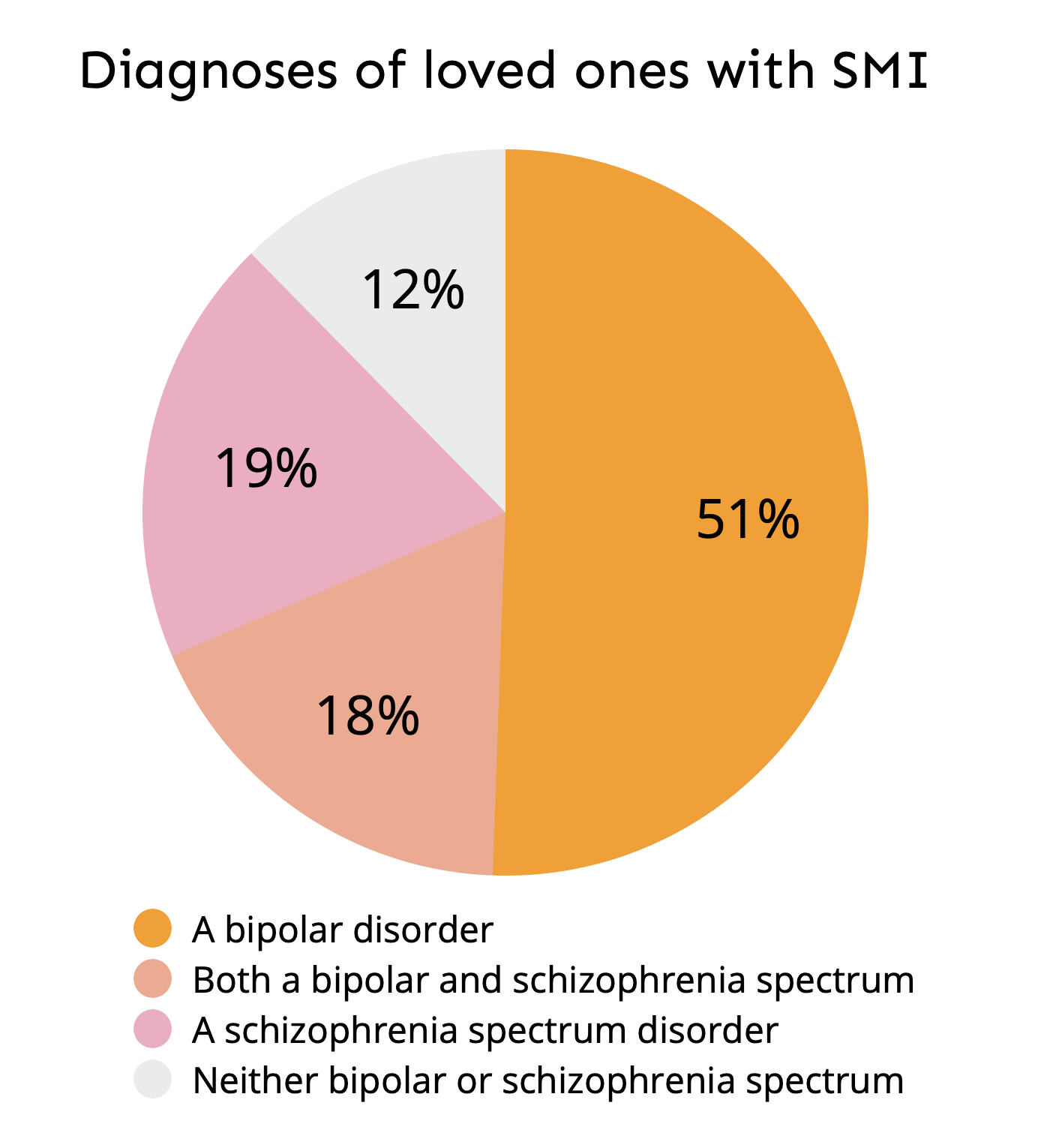
Family caregivers reported a range of diagnoses for their loved ones with SMI. The most common diagnoses reported were a bipolar disorder (including type 1, type 2 or of unknown type) (79%), a schizophrenia spectrum disorder (including schizophrenia and schizoaffective disorder) (37%) and major depression (62%). The 12% of reported diagnoses that did not include a bipolar disorder to a schizophrenia spectrum disorder all reported major depression as a diagnosis. Importantly, these diagnoses were also co-occurring with a range of other disorders or symptoms including personality disorders (9%), substance abuse (37%) and suicidal thoughts or attempts (48%).
Family caregivers wear many hats
Family members caring for a loved one with mental illness play many roles in their loved ones lives and in managing their care. The most common roles are to provide support in a crisis (73%), provide emotional support (70%) and to provide medical navigation support (63%). Medical system support spanned a range of activities including coordinating appointments (47%), finding the right doctors (45%), managing medical records (43%) and medication management (35%). Roles of the family varied by the type of family relationship. Parents especially take on the most different types of roles and are very likely to provide financial support and help with daily routines. Interestingly, more distant relations (the “other” category) were highly likely to provide a role in medical system navigation, particularly in finding the right doctors (63% of “other” family members).
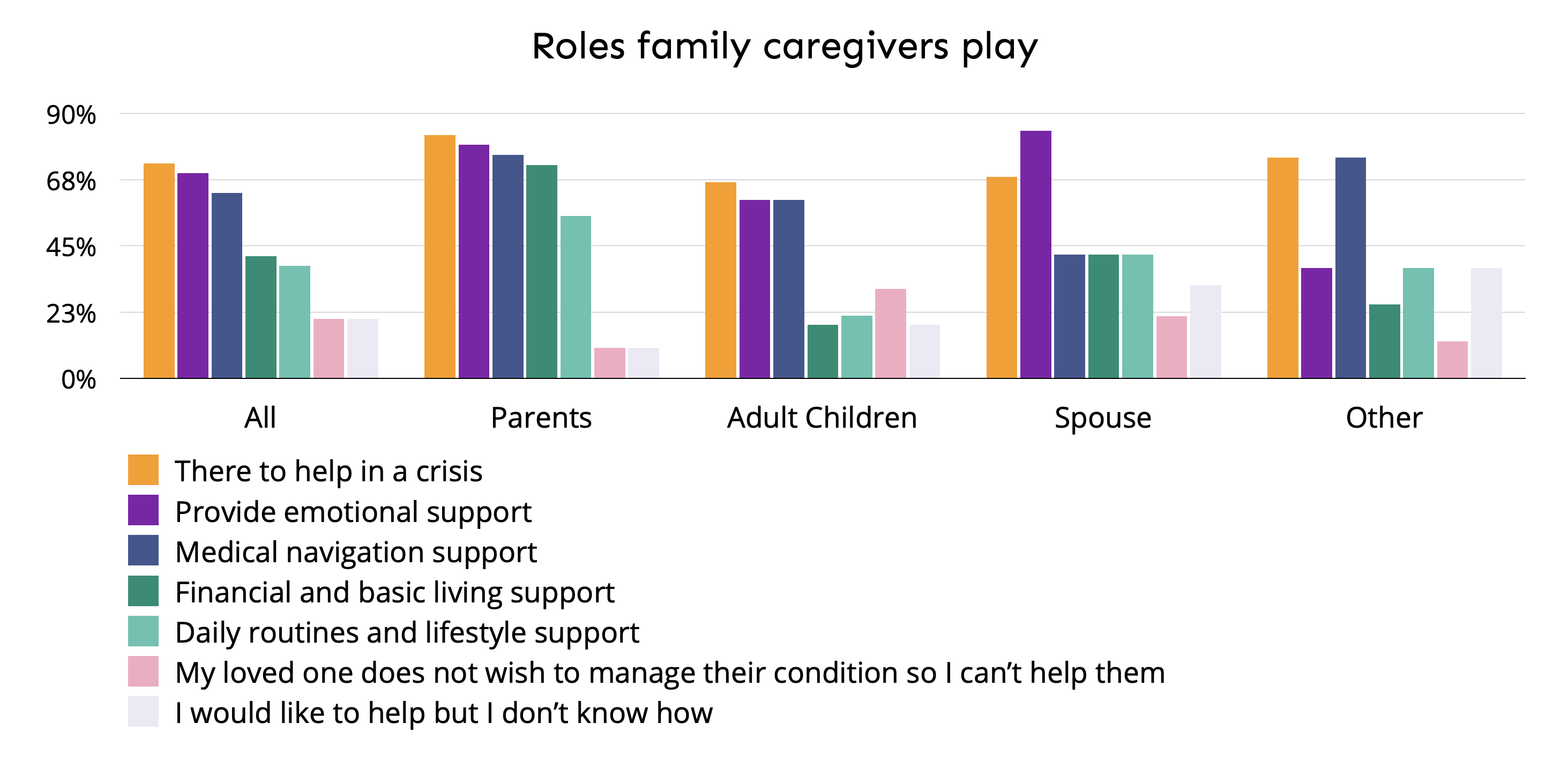
It’s clear that family caregivers are doing a lot.
Family caregivers face many challenges
We asked family caregivers to select their top three challenges in caring for someone with SMI. The most consistent top challenge caregivers reported was challenges associated with managing their own stress and emotional challenges (76%). This category included generally struggling to manage stress (46%), feeling alone without knowing who to turn to (35%) and struggling to set appropriate boundaries (37%). Adult children and spouses of loved ones with SMI were particularly likely to report these kinds of challenges (79% for adult children and 95% for spouses).
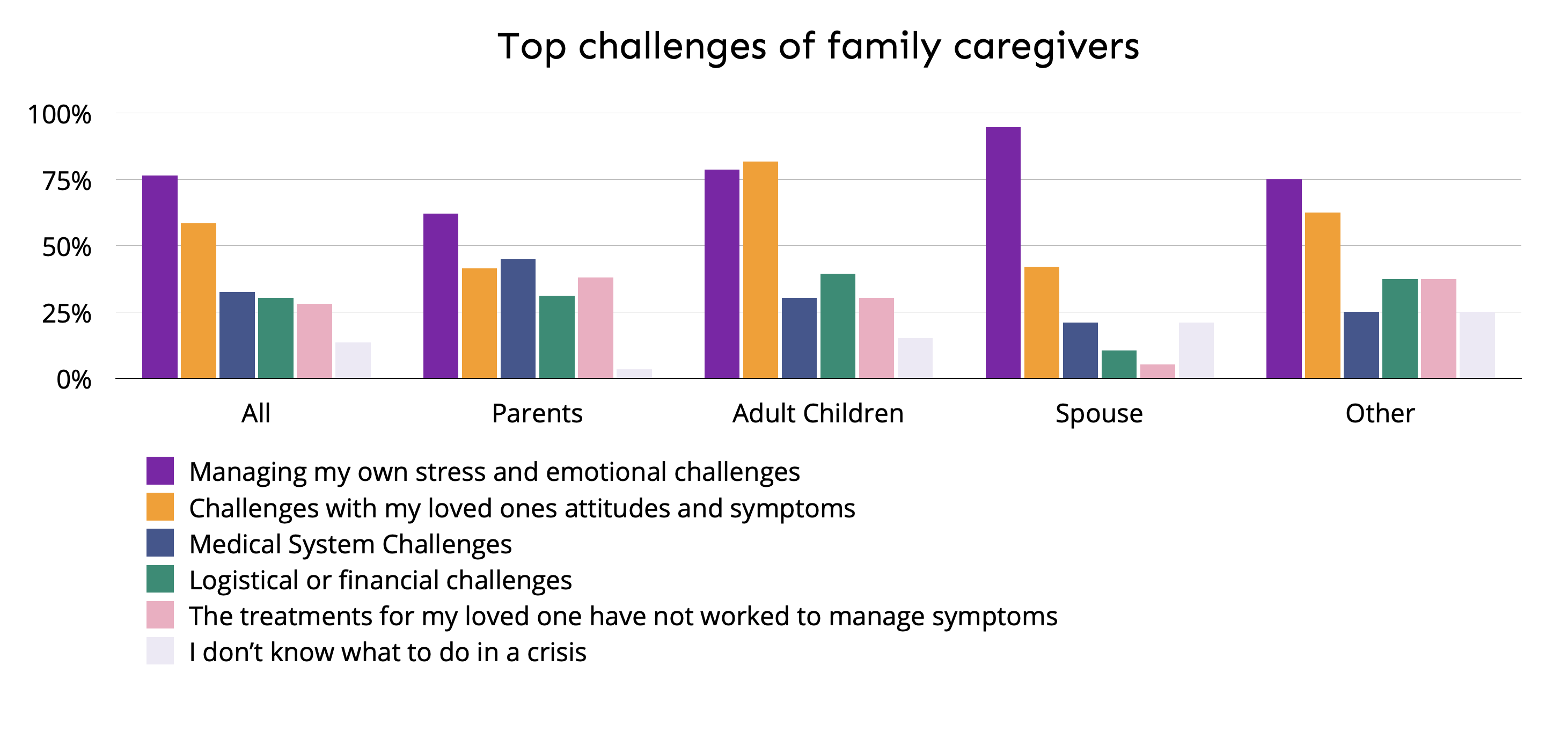
Challenges related to the loved ones attitudes and symptoms were also very highly reported (58%) and particularly likely for adult children of parents with SMI (82%). These symptom and attitude challenges included the loved one not wishing to manage their condition (25%), not taking medication consistently (26%) and generally being too difficult to spend time with (36%).
Interestingly, spouses were the least likely to report challenges with the medical system or with treatments not working. Potentially this could reflect a more stable and managed state in individuals that are married and have spousal support.
Family caregivers are looking for more support
We asked family caregivers what types of people might be most helpful for them in their journey and the answer was: many more people. Most consistently, family members what to talk to a peer who has the shared experience of what they are going through (79%). But many other types of support would be helpful as well, including relationship counseling (70%), personal stress counseling (63%), medical care navigation support (53%), expert education on the illness (44%) and general help learning what to do (44%). Parents in particular were consistently looking for help from the biggest range of potential professionals.
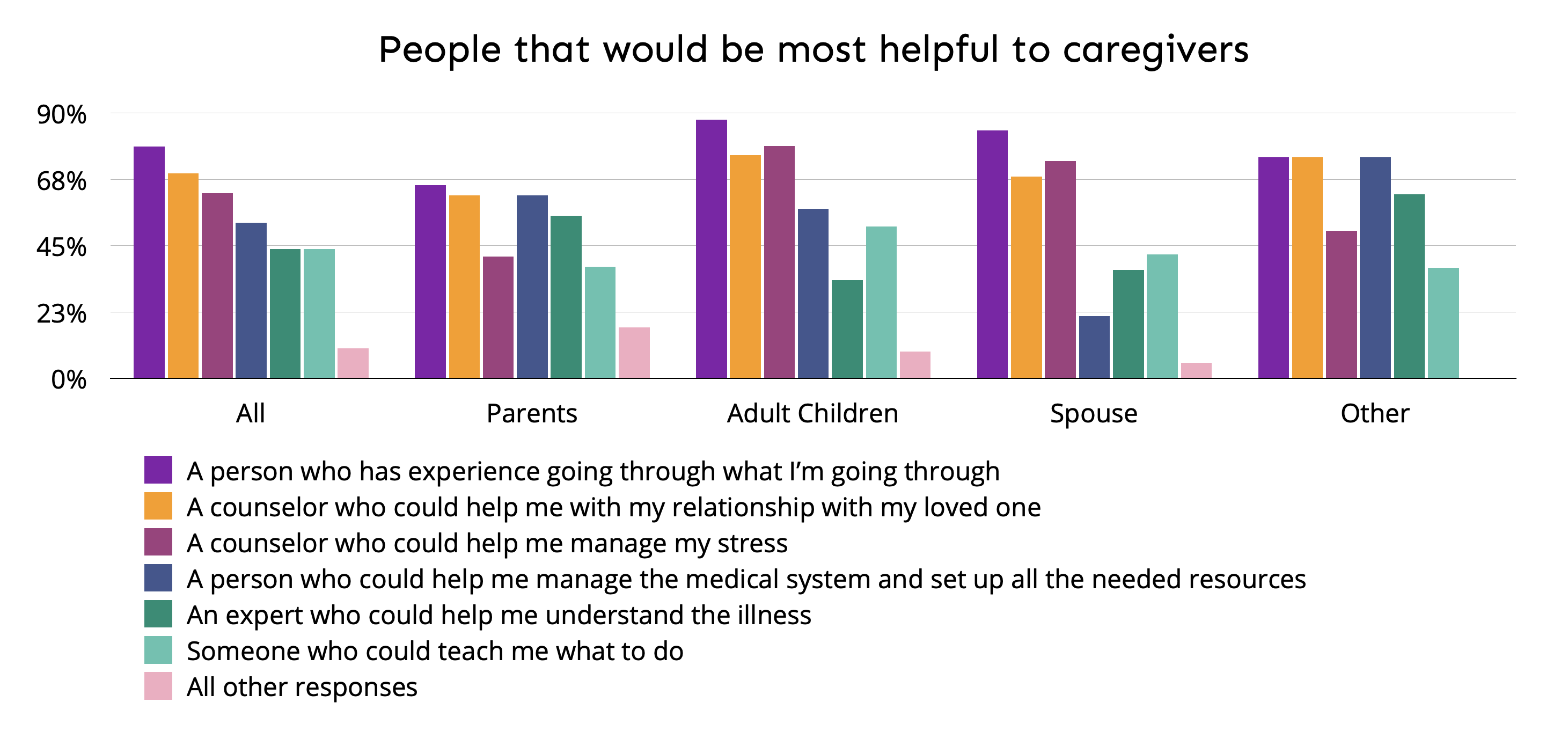
Family caregivers have wisdom to share
When family caregivers shared advice for others like them they were full of wisdom. The most clear and consistent theme in their advice was to first take care of yourself and find the peer and professional social support that you need to stay strong and mentally healthy on the journey. The image below includes quotes from family caregivers associated with circles that show the relative number of responses in the same theme.
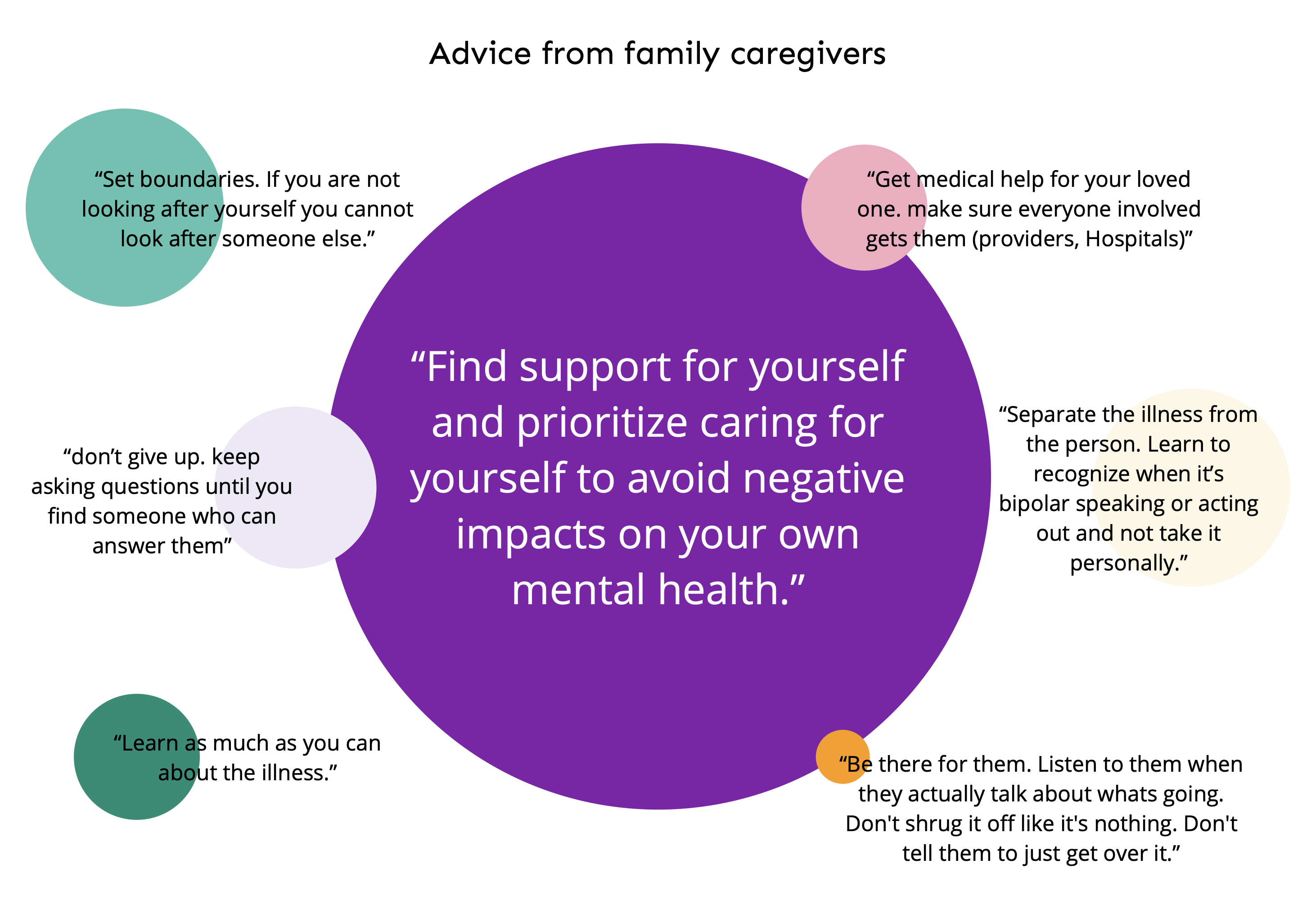
We hear you. We’re here for you.
Akin Mental Health is a new company working to build the tools and services that family caregivers need to navigate caring for a loved one with SMI. We’re launching soon with guided interactive activities and initial coaching services to start helping families. We’re humbled by the strength and support we feel from families who have been participating in our research. Thank you for everything that you do!
Notes on survey methods
This survey was conducted by Akin Mental Health between Feb 20th 2021 and April 20th 2021. The survey was conducted anonymously using Google Forms. All participation was voluntary and participants where not compensated for their responses. Participants were recruited primarily through NAMI online discussion forums as well as a few Facebook private groups. For further details or questions regarding our survey, please reach out to us at hello@akinmh.com.
